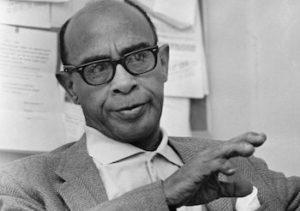
Heman Sweatt
*Heman Sweatt was born on this date in 1912. He was a Black educator, postal worker, and activist.
From Houston, Texas. Heman Marion Sweatt was the fourth of six children born to James Leonard Sweatt and Ella Rose Perry. His father had attended Prairie View Normal School, graduated in 1880, and became a schoolteacher. Later, he worked as a principal in Beaumont and moved to Houston for better economic opportunities.
Young Sweatt grew up in a relatively desegregated area of Houston, the third ward on Chenevert Street. Even though it was relatively integrated, Heman still experienced racism and Jim Crow. In October 1920, the Ku Klux Klan opened its Houston chapter. His father passed his love of education on to his children. All of them would go on to attend and graduate from college. But only Heman Sweatt would attend school in Texas.
He entered Wiley College in Marshall, Texas, in 1930 and graduated in 1934 with a Bachelor of Arts. Sweatt was regarded as one of the most brilliant students at Wiley College. In 1936, he became a teacher and substitute principal in Cleburne, Texas. In 1937, he attended the University of Michigan to become a physician. He enrolled in several challenging graduate courses, including bacteriology, immunology, and preventative medicine; by the end of his first academic year, he had completed twelve semester hours with a B+ average. In the summer of 1938, Sweatt became a postal carrier, decided not to return to the University of Michigan due to the severe winters, and remained in Texas.
In April 1940, he married his high school sweetheart, Constantine Mitchell, and bought a house. Like his father, his first interaction with the law was because he was concerned with the practices within the Postal Workers Union. “Concerned with discrimination against Blacks in the post office, where a worker had to be a clerk before promotion to a supervisory position and where blacks were systematically excluded from such positions, Sweatt challenged these practices as local secretary of the National Alliance of Postal Employees.
During the early 1940s, he participated in voter registration drives and raised funds for lawsuits against the white primary. Post offices stopped promoting Blacks to supervisory positions by systematically excluding them from clerical positions that would make them eligible for promotion. Sweatt wrote several columns for the Houston Informer and was a local secretary of the National Alliance of Postal Employees; he was concerned with discrimination and challenged these practices.
He became more interested in the law while preparing documentation for this case with an attorney. A few years later, in the mid-1940s, Sweatt decided to attend law school and asked William J. Durham to help him. Since Durham knew Texas didn't have law schools for Blacks, he advised Sweatt to apply to the University of Texas School of Law. Sweatt sought admission and responded to an appeal Lulu White made to a group of Houston Blacks for a volunteer to file a lawsuit. He also agreed to serve as the NAACP's plaintiff if he was rejected based on race.
Heman Marion Sweatt formally applied to the University of Texas School of Law. President Theophilus Painter held on to the application until the segregation laws were reviewed. Sweatt met with Painter, who informed him that although his credentials were adequate, he could not allow him to enter UT. Painter told Sweatt, “Nothing is available to you except for out-of-state scholarships.” The attorney general upheld the segregation laws and denied Sweatt entrance to UT; Sweatt retaliated by filing suit against Sweatt v. Painter on May 16, 1946.
The case went to court, and he eventually won. In June 1950, the Supreme Court decided that students were not offered an equal quality law education in the state of Texas, and as a result, UT would have to admit qualified black applicants. This was the exact date the court ruled on McLaurin v. Oklahoma Board of Regents in neighboring Oklahoma. On September 19, 1950, Sweatt registered for classes at the UT Law School. However, his mental and physical health had worsened due to the tremendous amount of stress and emotional trauma from the long-drawn-out court cases.
Sweatts' health declined, causing him to miss classes, obtain poor grades, and fail. These same tensions created a gap between him and his divorced wife. 1952, Sweatt withdrew from law school due to health issues and failing grades. He later received a scholarship to study social work at Atlanta University Graduate School. In 1954, he graduated with a Master’s degree in “Community Organizations,” moved to Cleveland, and did some work for the NAACP and the National Urban League for eight years. He then returned to Atlanta to continue work for their Urban League for twenty-three years.
Not only did he work for the Urban League Southern Political Office, but he also worked on voter registration to create programs for southern Blacks who migrated to the North. In 1963, Sweatt remarried Katherine Gaffney, with whom he had a daughter; later, they adopted another. Heman Marion Sweatt died on October 3, 1982, and his remains were cremated in Atlanta. The Travis County Courthouse, where his court case took place, was renamed “The Heman Sweatt Courthouse.” there is also a college scholarship set up in his name for $10,000.